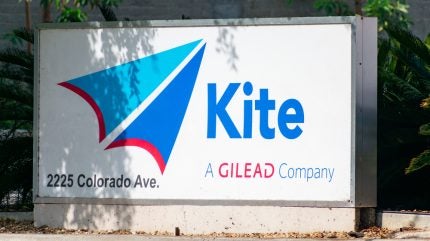

Gilead is soaring to new heights in the CAR-T therapeutics sector, acquiring in vivo cell therapy specialist Interius BioTherapeutics via its subsidiary Kite for $350m.
The deal will integrate Interius’ in vivo platform into Kite’s existing cell therapy framework, along with the uniting of research teams. The end goal is to generate CAR T-cells directly within the patient’s body, an approach that may “offer a more durable and long-lasting therapeutic effect”, according to Kite.

Discover B2B Marketing That Performs
Combine business intelligence and editorial excellence to reach engaged professionals across 36 leading media platforms.
Gilead acquired Kite for $11.9bn in 2017, and it operates as the big pharma’s cell therapy subsidiary.
By inserting DNA into a patient’s genome, unlike traditional CAR-T approaches in which cells are infused back into the blood, Interius aims to deliver therapy via a single intravenous infusion. Kite said that this has the added benefit of eliminating the need for preconditioning chemotherapy and complex cell processing.
Gilead is eying the technology to improve upon its two US Food and Drug Administration (FDA) approved CAR-Ts for types of blood cancer — Yescarta (axicabtagene ciloleucel) and Tecartus (brexucabtagene autoleucel). These are traditional ex vivo therapies that require cell harvesting, engineering and reinfusion – the steps that Interius seeks to eliminate.
“In vivo therapy is a promising frontier with the potential to transform how we approach treating patients, shifting to more accessible and scalable solutions,” said Cindy Perettie, Kite’s executive vice-president.

US Tariffs are shifting - will you react or anticipate?
Don’t let policy changes catch you off guard. Stay proactive with real-time data and expert analysis.
By GlobalDataAnalysis by GlobalData indicates that in vivo CAR-T therapies sidestep many of the drawbacks seen in ex vivo counterparts. Though warns that one concern is the inability to quality check before dosing, adding that more clinical data is needed to demonstrate safety.
Gilead is not the only big pharma company enticed by CAR-T-centric acquisitions so far this year. AbbVie bought CAR-T developer Capstan Therapeutics for $2.1bn in July while AstraZeneca spent $425m to acquire Belgium-based EsoBiotec in March. The deal for AstraZeneca comes a year and a half after it acquired Chinese CAR-T biotech Gracell for $1.2bn in December 2023.
For Interius, the deal marks a successful validation of its clinical activities. It was the first biotech to progress an in vivo CAR-T therapy into clinical trials. Its B-cell malignancy treatment candidate, called INT2104, entered a Phase I trial (NCT06539338) in October 2024.
Despite being armed with Interius’ innovative platform, Kite will have to navigate a currently volatile cell and gene sector in the US.
Vinay Prasad, director at the FDA’s Center for Biologics Evaluation and Research (CBER) – the department responsible for regulating cell and gene therapies, stepped down from his role in July only to return to his job two weeks later. Prasad has been against the use of surrogate endpoints as evidence for accelerated approvals in the cell and gene therapy sector, leading to uncertainty in the field for biotechs using this approach in clinical trials. Surrogate endpoints, such as overall response rate (ORR) and progression-free survival (PFS), are frequently used in CAR-T therapy trials to accelerate evaluation.
Cell & Gene Therapy coverage on Pharmaceutical Technology is supported by Cytiva.
Editorial content is independently produced and follows the highest standards of journalistic integrity. Topic sponsors are not involved in the creation of editorial content.





